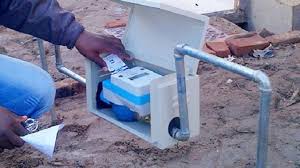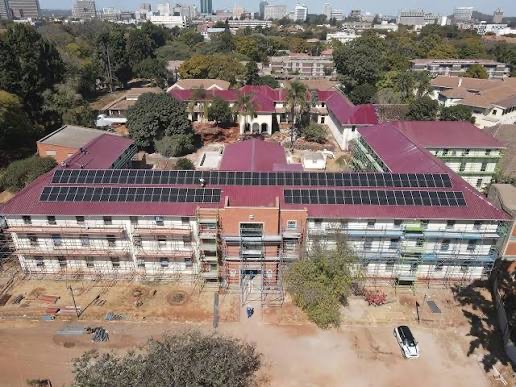By Marshall Bwanya
Harare — Residents have come out guns blazing over the government’s imposition of pre-paid water meters on them.
The multi-million programme is planned to commence in Harare and then spread to other cities and towns like Chitungwiza, Norton and Bulawayo.
The residents are worried that the government is prioritising revenue collection of their right to choose what they want.
The rollout, set to begin in the coming weeks, comes as Harare and its surrounding towns are grappling with erratic and often unsafe water supplies.
This project, involving 600,000 prepaid meters in its first phase, has been presented by government as a strategy to improve water management and revenue collection under a Build-Operate-Transfer (BOT) model.
The contract was awarded without tender to Chinese firm Hangzhou Liaison Technology Company and local company Helcraw Electrical, owned by Zanu PF Murehwa West MP Farai Jere.
The terms of the deal remain undisclosed to the public.
Permanent Ngoma, executive director of the Bulawayo Progressive Residents Association (BPRA), condemned the rollout, describing it as unjust and exclusionary.
“We do not support the introduction of prepaid water meters, particularly in high-density communities.
“We believe this system is not inclusive, especially for vulnerable groups such as the elderly, low-income households, and persons with disabilities,” she said.
Ngoma added that prepaid systems are unsuitable in areas with inconsistent water supply.
“Expecting residents to pay upfront for a service they cannot rely on is not only unjust but also exploitative,” she added.
She also raised alarm over the role of foreign contractors in essential public services.
“Water must never become a commodity accessible only to those who can afford it.
These are critical services that must be provided by the government to its people.”
Despite BPRA’s ongoing advocacy and public engagement including policy submissions and the #WaterJustice campaign, Ngoma said decisions are still being made without genuine public consultation.
“Rolling out prepaid water meters without considering the concerns of the people affected only deepens the disconnect between policymakers and the communities they serve,” she added.
In Harare, where erratic water supply is a long-standing crisis, Precious Shumba, director of the Harare Residents Trust (HRT), said the policy is flawed and primarily benefits private interests.
“Prepaid water meters do not increase the quantity of water supplied to residents, nor do they enhance the water quality,” Shumba said.
“Prepaid water meters are the surest way of enriching private companies and individuals involved in the whole project.
“There is no guarantee that there will be transparency and accountability in the utilisation of water-generated revenue,” added Shumba.
He called on authorities to focus on service delivery.
“The solution is in the replacement of rotten underground water pipes to plug the leakages and significantly reduce non-revenue water.
Once residents receive consistent water supplies, revenue generation will naturally increase,” said Shumba.
Combined Harare Residents Associations (CHRA), director Rueben Akili lamented that government was planning to implement the installation of prepaid meters without doing proper consultations with residents and stakeholders.
“The decision for installation of prepaid water meters has been a top down approach, and as you are aware the city of Harare did install prepaid water meters in Kambuzuma and Sunningdale but the project failed.
“Our crisis here in Harare is a governance issue which cannot be replaced by prepayment, that is important and again for the central government to impose this project on the residents without proper consultation is an indicator that this project again will fail,” said Akili.
“It will not improve water, but will alienate marginalisedcommunities and persons.
“When water is privatised it becomes costly and those who privatise water their agenda are a profit motive.
“The privatisation of water however requires the amendment of the water act and urban councils act,” added Akili.
Residents’ associations argue that their challenges stem from poor governance and lack of transparency, and that the installation of prepaid water meters will not improve service delivery.
In Chitungwiza, where nearly half a million people depend on private boreholes and unreliable municipal water, fears of unaffordable charges loom.
Alice Kuvheya, director of Chitungwiza Residents Trust (CHITREST), echoed concerns about the privatisation of water services.
“Water is not a privilege but a right.
“These companies that will be coming to Chitungwiza and other areas will be charging us exorbitant amounts that we cannot afford,” she said.
Kuvheya added: “We are saying no to privatisation of water.”
“Why can’t the government build us our own dam so that we can have our own water,” added kuvheya.
Not all residents’ groups oppose the plan.
The Zimbabwe National Organisation of Associations and Residents Trust (ZNOART) which purports to be an apex body representing all residents and Associations in Zimbabwe welcomed the move.
Shalvar Chikomba, ZNOART national chairperson, said prepaid meters would ensure accountability.
“We think if there are prepaid water meters, it means as residents we will be able to pay for water which we would have used. This is a welcome move to our residents,” he said.
However, he called for inclusion.
“We hope it shall be done transparently, and that residents’ associations are included in implementing these BOTs.”
As the rollout nears, deep divisions remain.
Residents fear the policy will monetise a basic right, entrench inequality, and leave the poorest most vulnerable in a system designed to recover costs not deliver dignity.
Source – NewsHub



